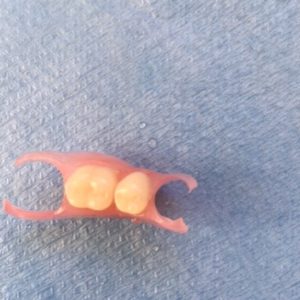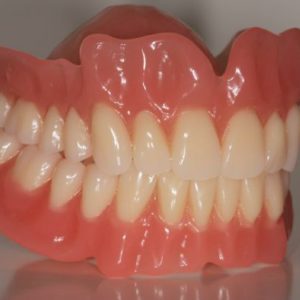In my last blog I began to tell you about Dentures; what they are and why we might need them. If you haven’t yet read the last blog then please click here. This blog is going to concentrate on the pros and cons and the different varieties of Dentures.
Metal Dentures:
If you have remaining teeth then you may want to consider metal dentures. The present teeth are used to hold the dentures in place and support them. This is done by a small metal wire that clips around your teeth. The little wires are known as clasps and these are actually cast as part of the metal framework within the denture. This means they are extremely stable and will last for many years. Metal dentures are made using cobalt chrome. Cobalt chrome is a very strong metal that has a higher resistance to corrosion. It’s hypoallergenic and is also lighter weight than most metals making it incredibly suitable for dentures.
Advantages of Metal Dentures:
- Bio-compatible and hypoallergenic
- Stronger and sturdier
- Can feel more natural from the weight of the metal
- Last longer than other dentures
- Hygienic and gum friendly
Disadvantages of Metal Dentures:
- Some people dislike the weight of the metal
- The clasps can be visible since they are made of metal
- They are not permanent
Flexi Dentures:
Flexible dentures are a type of partial denture made of a thin thermoplastic such as nylon compared to thicker more rigid acrylic used in full dentures. Flexi dentures are most suitable for patients missing up to four teeth on each side of the mouth. Some people favour flexi dentures over metal dentures because metal dentures have metal coloured clasps which although sturdier, may not be to everyone’s cosmetic taste. Flexi dentures are a sensible option for those looking to fill missing teeth gaps but aren’t yet ready to go for implants.

Advantages of Flexi Dentures:
- Treatment for flexi dentures is non-evasive
- They look virtually invisible and natural since they use a flexible material to clasp onto remaining teeth instead of metal
- Comfortable in the mouth because of the flexibility
Disadvantages of Flexi Dentures:
- They cannot be altered such as adding more teeth
- They cannot be relined
Acrylic / Plastic Dentures
Acrylic dentures consist of the denture teeth being attached to an acrylic base plate. These are the most suitable option for somebody who had lost all of their teeth. They usually consist of replacement teeth attached to pink or gum-colored plastic bases. Dentists recommend that acrylic dentures be replaced every 5 years as the gums and ridges of the mouth change over time. However, many people keep their acrylic dentures for many years because as long as they are maintained properly, the outward appearance will still look good.

Advantages of having Acrylic Dentures:
- Easiest type of dentures to put in and out of your mouth
- Easy to alter such as adding another tooth
- Perfect for a temporary option whilst waiting for implants or full dentures
Disadvantages of Acrylic Dentures:
- Often bigger and bulkier than other dentures
- Tend to break more easily
- Least retention
Summary:
I hope that by reading this blog you feel like you are more informed about the types of dentures and what each can offer. Of course, the only person who really knows what’s best for you is you. So, I recommend that you book a consultation with your dentist at Brandon Dental Surgery 01842 810 752 so that you can go through all your available options and pick whichever works best for you!
